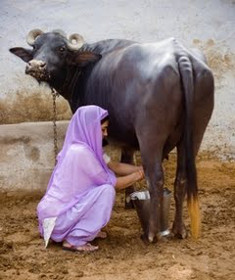 Charles Sturt University (CSU) scientists
hope to lighten the workload of farming women in the tribal regions of North West
Pakistan by introducing them to technology commonly used in Australian cattle
herds.
Charles Sturt University (CSU) scientists
hope to lighten the workload of farming women in the tribal regions of North West
Pakistan by introducing them to technology commonly used in Australian cattle
herds.
An extension project involving researchers from CSU's School of Animal and Veterinary Sciences and Graham Centre in Australia and the University of Agriculture Peshawar in Pakistan will train women's groups from isolated mountain villages in bovine reproductive management.
The project has received a $100,000 Grand Challenges Explorations grant, an initiative funded by the Bill & Melinda Gates Foundation, and is the idea of CSU Masters student and Adjunct Research Associate Mr Mohammad Riaz Khan.
"The project acknowledges the role of women in rural dairy farming and aims to ease their workload through improved livestock management techniques with advice from a panel of local and international dairy experts," said Mr Khan.
Also involved is CSU Professor of Animal Production Peter Wynn, who's led research and extension programs in the dairy industry in Pakistan for the past 7 years.
"In Pakistan, the buffalo is an integral part of rural as well as urban dairy systems, providing over half of all milk supplies: Pakistani families simply love the very high fat content of buffalo milk" he said.
"Traditionally, women are responsible for feeding and hand milking the family herd of two to four animals. They also have to rear the calves and watch the herd for signs of ovulation activity around the clock."
Professor Wynn said this extension program will train the women to use a progesterone implant, or controlled internal drug release system, to synchronise the ovulation of the cattle herd.
"Using this simple technology means the farming women will only have to keep track of oestrus behaviour for 48 to 72 hours each time the animal cycles," he said. The oestrous synchronization will also contribute towards decreasing inter-calving interval in Pakistani dairy buffaloes.
"Then they will have more time on most days to complete their other chores and perhaps value add to their milk by producing products like butter, ghee, lassi, yoghurt or sweets which are sold to help with the family budget," Professor Wynn said.
The 18 month project is being led by Mr Khan, who is based in Pakistan as a Lecturer in Veterinary Medicine at the University of Agriculture Peshawar with guidance from staff at CSU's School of Animal and Veterinary Sciences, and CSU's Adjunct Professor Subhan Qureshi, who heads the dairy research program at the University of Agriculture.
CSU Professor of Animal Production Peter Wynn leads an Australian Centre for International Agricultural Research (ACIAR) funded team providing dairy extension expertise to the Pakistani dairy industry. Read more about his work on CSU News.





Social
Explore the world of social